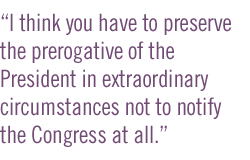An overview of the vice president's views on presidential power and covert action that shows a remarkable consistency from the 1980s to today.
- Nov. 1987 - excerpts from the minority report on Iran-contra
- Nov. 1987 - Newshour comments on Iran-contra
- 1989 essay - "Congressional Overreaching in Foreign Policy"
- Dec. 1990 - an exchange with Sen. Edward Kennedy
- Dec. 2005 - comments on Bush administration's domestic wiretapping
November 1987
Congressman Richard Cheney was the ranking Republican on the congressional committee investigating the Iran-contra affair, in which Reagan administration officials secretly diverted the proceeds of arms sales to Iran to fund the contras in Nicaragua, who were fighting to oust the left-wing government. Below are excerpts from the section of the committee's minority report on presidential power, which Cheney and his staff authored.
"Judgments about the Iran-Contra Affair ultimately must rest upon one's views about the proper roles of Congress and the President in foreign policy. ... [T]hroughout the Nation's history, Congress has accepted substantial exercises of Presidential power -- in the conduct of diplomacy, the use of force and covert action -- which had no basis in statute and only a general basis in the Constitution itself. ... [M]uch of what President Reagan did in his actions toward Nicaragua and Iran were constitutionally protected exercises of inherent Presidential powers. ... [T]he power of the purse ... is not and was never intended to be a license for Congress to usurp Presidential powers and functions.

...
"The boundless view of Congressional power began to take hold in the 1970's, in the wake of the Vietnam War. The 1972 Senate Foreign Relations Committee's report recommending the War Powers Act [which requires presidents to seek Congressional authorization if they deploy U.S. troops for longer than 60 days], and the 1974 report of the Select Committee on Intelligence Activities (chaired by Senator Frank Church and known as the Church Committee), both tried to support an all but unlimited Congressional power by invoking the "Necessary and Proper" clause. That clause says Congress may 'make all Laws which shall be necessary and proper for carrying into Execution the foregoing [legislative] Powers, and all Powers vested by this Constitution in the Government of the United States, or in any Department of Officer thereof.' The argument of these two prominent committees was that by granting Congress the power to make rules for the other departments, the Constitution meant to enshrine legislative supremacy except for those few activities explicitly reserved for the other branches.
"One must ignore 200 years of constitutional history to suggest that Congress has a vast reservoir of implied power whose only limits are the powers explicitly reserved to the other branches. ... The Necessary and Proper clause does not permit Congress to pass a law usurping Presidential power. A law negating Predidential powers cannot be treated as if it were 'necessary and proper for carrying' Presidential powers 'into E
![The Dark Side [home]](../art/p_title.gif)